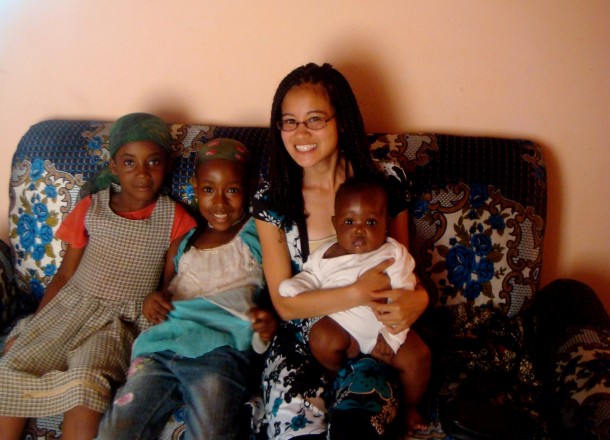Journalists use it as a verb. Politicians treat it as an idea. But climate change is really a story about people.
 "Last fall I got almost no harvest. There was not enough rain," farmer Kassa Danfakha of Kedougou, Senegal, told Oxfam in 2012. "The first rains came and the seeds we planted started to grow, but then the rain was very irregular." Millions of farmers like Danfakha faced a food crisis that year in part because of this shortage of rainfall. Photo: Brett Eloff/Oxfam America
"Last fall I got almost no harvest. There was not enough rain," farmer Kassa Danfakha of Kedougou, Senegal, told Oxfam in 2012. "The first rains came and the seeds we planted started to grow, but then the rain was very irregular." Millions of farmers like Danfakha faced a food crisis that year in part because of this shortage of rainfall. Photo: Brett Eloff/Oxfam America
From the Keystone XL pipeline to a corn field in central Africa, what a 10-year-old taught me about the global issue that affects us all.
I’m sitting on the my edge of seat for the House of Representatives vote on the Keystone XL pipeline which would ship oil from Canada to the Gulf Coast. Jobs, environment, a Republican-controlled Congress, a Democratic President ready to veto. This is the stuff political nerds love right?
President Obama has made it clear that he would only provide approval of the 1,000-mile pipeline if it did “not significantly exacerbate the problem of carbon pollution.” However, last week the Environmental Protection Agency emphasized that the pipeline could potentially spur greenhouse gas emissions. In other words, since oil prices have dropped recently, constructing the pipeline would enable oil companies to expand development leading to gas emissions that contribute climate change.
I worry about climate change. Journalists will often write about it as a verb, politicians may discuss it as an idea, but as an aid worker, I’ve seen the effects of it first-hand. For me, climate change is a story of people, including a 10-year-old girl in Central Africa.
I spent exactly 23 months working in economic development in Ngaoundere, Cameroon. Being a single professional, my neighbors soon became my family and as the only American in town, the kids thought I was the coolest thing besides the latest Nigerian pop music album. Aissatou, a 10-year-old who lived next to me, would often walk with me to the market, both of us keeping each other company.

In this city located in the Adamawa region, there are two seasons: rainy and dry. If you ask anyone in town, they prefer the rainy season. With so many unpaved roads, the dry season brings about dust that floats everywhere. Once after a long bus ride, I thought I was getting tanner due to the African sun…until I washed the “tan” off because so much dust was on me.
Growing up in Southern California, I preferred the heat and sunshine any day over the cold and wet. “I don’t like the rain, Aissatou. I prefer the dry season with the sunshine,” I said as a drizzle came down on us.
“The rain is good,” she told me, skipping in a circle. I assumed she would say that it’s fun to play in the rain as kids do. “The rain is good because it feeds the plants, so we’ll be able to have food to eat.”
Aissatou was spot on. Rains had been slim in 2011 and thus, the farmers were upset that their crops had yet to produce the amounts that they needed for their livelihoods. “It doesn’t rain like it used to,” one of the farmers had told me the week before. “I barely have enough corn to sell at the market and I don’t know if it’s going to get worse or not.”
The farmer had been right about the drought, and unfortunately, four years later, climate change is only getting worse from California to Liberia. This is a truly global issue that affects us all.
However, there is always a silver lining on every cloud. As a professional who spends a majority of her life traveling, I’ve seen what happens when we start paying attention to how our actions can affect other countries. In November 2014, two incredible things happened: both US and China agreed to a plan to address their respective country’s harmful greenhouse gas emissions and President Obama committed to providing $3 billion to the Green Climate Fund to help the world’s poorest countries deal with the effects of climate change. Recently, concerned customers like you also had great success in convincing two giant food companies to do their part.
I don’t know what the outcome of the Keystone XL pipeline will be, but I know climate change must be a major consideration. As we see record snowfall here in Boston at Oxfam America headquarters, I can only hope some rain makes it over to the drought-stricken areas of the world. And if it does, I know Aissatou will be skipping to the sound of it all.